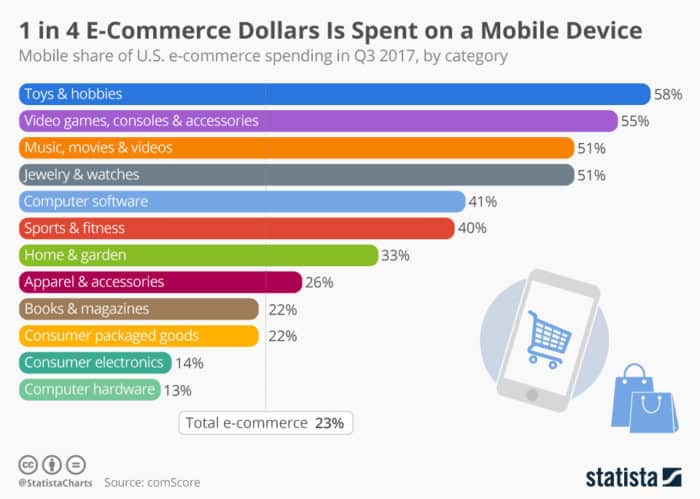Mobile shopping is not as important as you think

Mobile shopping is a really hot trend at the moment. Everywhere you turn there is advice about making sure you focus on mobile. Indeed, Google won’t even bother to index your website unless you have a “mobile-first” strategy. Every day there are predictions about how mobile marketing is set to soar.
The statistics are impressive. The sum total of Google Analytics studies suggests that 40% of all online transactions are now completed on a mobile device. The analysts Forrester predict that mobile commerce will grow at a compound rate of 18% a year for the next five years. Amazon is not amazed. Back in 2015, it reached the point where the majority of purchases made from its website are through a mobile device. Mobile shopping is huge and for some businesses it is fundamental. Ask Asos.
However, it is easy to get carried away with all the hype and enthusiasm. The desktop is still a good place to sell from…!
Why the desktop beats mobile shopping
In spite of the obvious growth of mobile, there are still plenty of reasons to consider desktop as the main source of income for many businesses. These reasons include the following:
- Most online sales are “business to business” and not “business to consumer”; mobile shopping is predominantly a consumer activity
- Mobile shopping purchases are a low value; desktop shopping purchases tend to be much higher in value
- Conversion rates for shops are much higher on a desktop device compared with mobiles
- Most of the mobile shopping is done in a small number of consumer sectors only
The total proportion of mobile shopping is only 23% of all the money spent online. That means that 77% (more than three-quarters) of online shopping is NOT mobile. Furthermore, almost all the mobile shopping takes place in just a handful of sectors such as toys, software and entertainment. Of course, if your business is in one of those sectors then you really do need to focus on mobile. But most businesses are not in the sectors where most of the mobile shopping takes place.
In other words, the “headline figures” about mobile shopping don’t provide the context or any real analysis of what is going on.
People still love the desktop
In spite of our love-affair with mobile phones, the desktop is still of significant value to people. For a start, it affords them a much bigger view of images and videos so they can see the detail necessary to help inform their purchasing decisions. On top of this, it is still cumbersome to shop on a mobile phone when you are buying something that requires lots of information or input from you as a buyer. It is so much quicker to do that on a desktop using a keyboard.
The fact that people like desktops is given away with studies on the use of email. Most email is now viewed on a mobile device. At least that is the “truth” if you consider how most people first access their email. But what they appear to do is to open their emails, delete unnecessary messages and spam and then re-open the ones that need dealing with later, when they get back to their desktop. So mobiles are not really used as an email device; rather they are an email sorting machine, allowing email to be done on a desktop once that process has taken place.
Getting hooked on the “mobile is essential” hype is to ignore the detail of what is going on and failing to focus on what people are really doing. If you want to get the highest income from most sectors, you still need to focus on the desktop – no matter what Google might tell you.

